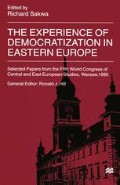Abstract
One of the main options for a post-totalitarian identity is the concept of nation. This is especially important among the intellectual elite of non-dominant ethnic groups or so-called ‘small people’ that were absorbed into empires or multi-ethnic states. Patriotic or even nationalistic identities break through under conditions of nominal independence. This is most obvious in the texts of historians, writers, politicians and other relevant producers of identity and ideology. Facing the loss of the previous identity, with its quasi-theoretical basis, post-imperial historians become the great white hope of their people to find a new spring of identity in national history. Moreover, they are confronted by the demand for a written past which is usable for explaining the present and predicting the future.
Access this chapter
Tax calculation will be finalised at checkout
Purchases are for personal use only
Preview
Unable to display preview. Download preview PDF.
Notes
Michael Confino, ‘Present Events and the Representation of the Past: Some Current Problems in Russian Historical Writing’, Cahiers du Monde Russe, Vol.35, No.4 (October-December 1994), pp.839–68 (p. 843).
Gerhard Brunn, ‘Historical Consciousness and Historical Myths’, in Andreas Kappeler (ed.), The Formation of National Elites: Comparative Studies on Governments and Non-dominant Ethnic Groups in Europe, 1850–1940 (Aldershot, 1992), Vol.6, pp.327–38.
On the ‘invention of history’ see Benedict Anderson, Imagined Communities (London, 1983);
Ernest Gellner, Nations and Nationalism (Oxford, 1983); E. J. Hobsbawm and T. Ranger (eds), The Invention of Tradition (Cambridge, 1983);
E. J. Hobsbawm, Nations and Nationalism since 1780: Programme, Myth, Reality (Cambridge, 1990).
On Belarus see Markus Osterrieder, ‘Von der Sakralgemeinschaft zur modernen Nation. Die Entstehung eines National-albewußseins unter Russen, Ukrainern und Weißrußenen in Lichte der Thesen Benedict Andersons’, in E. Schmidt-Hartmann, Formen des nationalen Bewußtseins im Lichte zeitgenössischer Nationlismustheorien (Munich, 1994), pp.197–232.
See Henadz Sahanovich, ‘National Character of History as a Science’, Belarusian Historical Review, Vol.1, 1994, pp.5–14 (p. 11) (in Belarusian).
An outline of this conception was given by the director of the Institute of History, Belarusian Academy of Sciences, M. P. Kaschuk, ‘Natsyyanalnaya kantseptsyya historyi Belarusi: Asnounyya padykody’, Histarychnaya navuka i histarychnaya adukatsyya u Respublitsy Belarus. Novyya kantseptsyi i padykody, Vol.1, Historyya Belarusi (Minsk, 1994), pp.3–10. For further information see Rainer Lindner, ‘Nationsbildung durch Nationalgeschichte. Probleme der aktuellen Geschichtsdiskussion in Weißrußland’, Osteuropa, Vol.44, No.6, 1994, pp.578-90; and Astrid Sahm, ‘Politsche Konstruktionsversuche weißrussischer ldentität. Zur Bedeutung des Rückgriffs auf Geschichte für die unabgeschlossene weißrussiche Nationsbildung’, Jahrbücher für Geschichte Osteuropas (JfGOE), Vol.42, No.4, 1994, pp.541–61.
Early works include Takayuki Ito (ed.), Facing Up to the Past: Soviet Historiography under Perestroika (Sapporo, 1989);
R. W. Davies, Soviet History in the Gorbachev Revolution (London, 1989);
Dietrich Geyer (ed.), Die Umwertung der Geschichte (Göttingen, 1991).
See Orest Subtelny, ‘Die gegenwärtige Situation der ukrainischen Historiographic: Ein Überblick’, in Guido Hausmann and Andreas Kappeler (eds), Ukraine: Gegenwart und Geschichte eines neuen Staates (Baden-Baden, 1993), pp.350–69.
See Voprosy istorii, 1963, No.3 pp.120–25. Authors from Moscow advised their colleagues from Minsk that it was not necessary for them to ‘bow down’ in this manner. On non-Russian Soviet historiography and Soviet historiography on nonRussian nationalities before Brezhnev, see Lowell Tillett, The Great Friendship: Soviet Historians on the Non-Russian Nationalities (Chapel Hill, NC: 1969);
Albrecht Martiny, ‘Das Verhältnis von Politik und Geschichtsschreibung in der Historiographie der sowjetischen Nationalitäten seit den sechziger Jahren’, JfGOE, Vol.27, No.2, 1979, pp.238–72. For the perestroika era and the rewriting of history of the former Soviet nationalities, see Uwe Halbach, ‘Die Nationalitätenfrage: Kontinuität und Explosivität’, in Dietrich Geyer (ed.), Die Umwertung der sowjetischen Geschichte (Göttingen, 1991), pp.210–37.
See Bohdan Nahaylo and Victor Swoboda, Soviet Disunion: A History of the Nationalities Problem in the USSR (New York, 1990), pp.210–37.
Editor information
Editors and Affiliations
Copyright information
© 1999 Palgrave Macmillan, a division of Macmillan Publishers Limited
About this chapter
Cite this chapter
Lindner, R. (1999). Continuity and Change in Post-Soviet Historiography. In: Sakwa, R. (eds) The Experience of Democratization in Eastern Europe. International Council for Central and East European Studies. Palgrave Macmillan, London. https://doi.org/10.1007/978-1-349-14511-9_4
Download citation
DOI: https://doi.org/10.1007/978-1-349-14511-9_4
Publisher Name: Palgrave Macmillan, London
Print ISBN: 978-1-349-14513-3
Online ISBN: 978-1-349-14511-9
eBook Packages: Palgrave Political & Intern. Studies CollectionPolitical Science and International Studies (R0)

